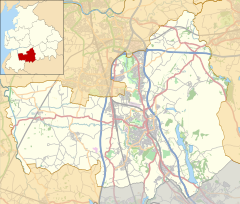Bank Hall
| Bank Hall | |
|---|---|

The daffodils on the tower lawn at Bank Hall
|
|
| Location | Bretherton, Lancashire, England |
| Coordinates | 53°40′32″N 2°48′54″W / 53.6756°N 2.8151°WCoordinates: 53°40′32″N 2°48′54″W / 53.6756°N 2.8151°W |
| Area | 18 acres (7.3 ha) [Gardens] |
| Built | 1608 |
| Built for | William/Henry Banastre (1608) George Anthony Legh Keck (1832) |
| Demolished | (North East Wing ~ approx 1940) |
| Rebuilt | 18th century (?) 19th century (1832–1833) |
| Restored | Awaiting Restoration |
| Architect |
George Webster 1832 [Renovation] |
| Architectural style(s) | Jacobean |
|
Listed Building – Grade II*
|
|
| Designated | 22 October 1952 |
| Reference no. | 184269 |
|
Location in the Borough of Chorley
|
|
Bank Hall is a Jacobean mansion in Bretherton, Lancashire, England. It is a Grade II* listed building. The hall was built on the site of an older house in 1608 by the Banastres who were lords of the manor. The hall was extended during the 18th and 19th centuries. Extensions were built for George Anthony Legh Keck in 1832–1833, to the design of the architect George Webster.
Legh Keck died in 1860 and the estates passed to Thomas Powys, 3rd Baron Lilford. The contents were auctioned in 1861 and the hall used as a holiday home and later leased to tenants. During the Second World War the Royal Engineers used it as a control centre. After the war the estate was returned to the Lilfords whose estate offices moved to the east wing of the house until 1972 when the house was vacated. The building was used as a location for the 1969 film The Haunted House of Horror.
The house was vandalised causing rapid deterioration. In 1995 the Bank Hall Action Group was formed to raise public awareness, collect funds, host events, and clear the overgrown grounds. In 2003 Bank Hall was the first building to be featured in the BBC's Restoration television series. Since 2006 the action group and Urban Splash have planned to restore the house as apartments retaining the gardens, entrance hall and clock tower for public access and the Heritage Trust for the North West (HTNW) plans to renovate the potting sheds and walled gardens.
For centuries Bank Hall was the manorial home of a branch of the Banastres, lords of the manor descended from the Norman Roger de Banastre, who built a motte and bailey castle at Prestatyn in about 1164. In 1167 the Banastres fled when Owain Gwynedd, Prince of North Wales, destroyed the castle and the family escaped to Cheshire and Lancashire. In 1315 Sir Adam Banastre, who had extensive landholdings elsewhere in the county, led the Banastre Rebellion against Thomas, 2nd Earl of Lancaster, and was summarily beheaded at Charnock Richard when the rebellion failed.
...
Wikipedia

